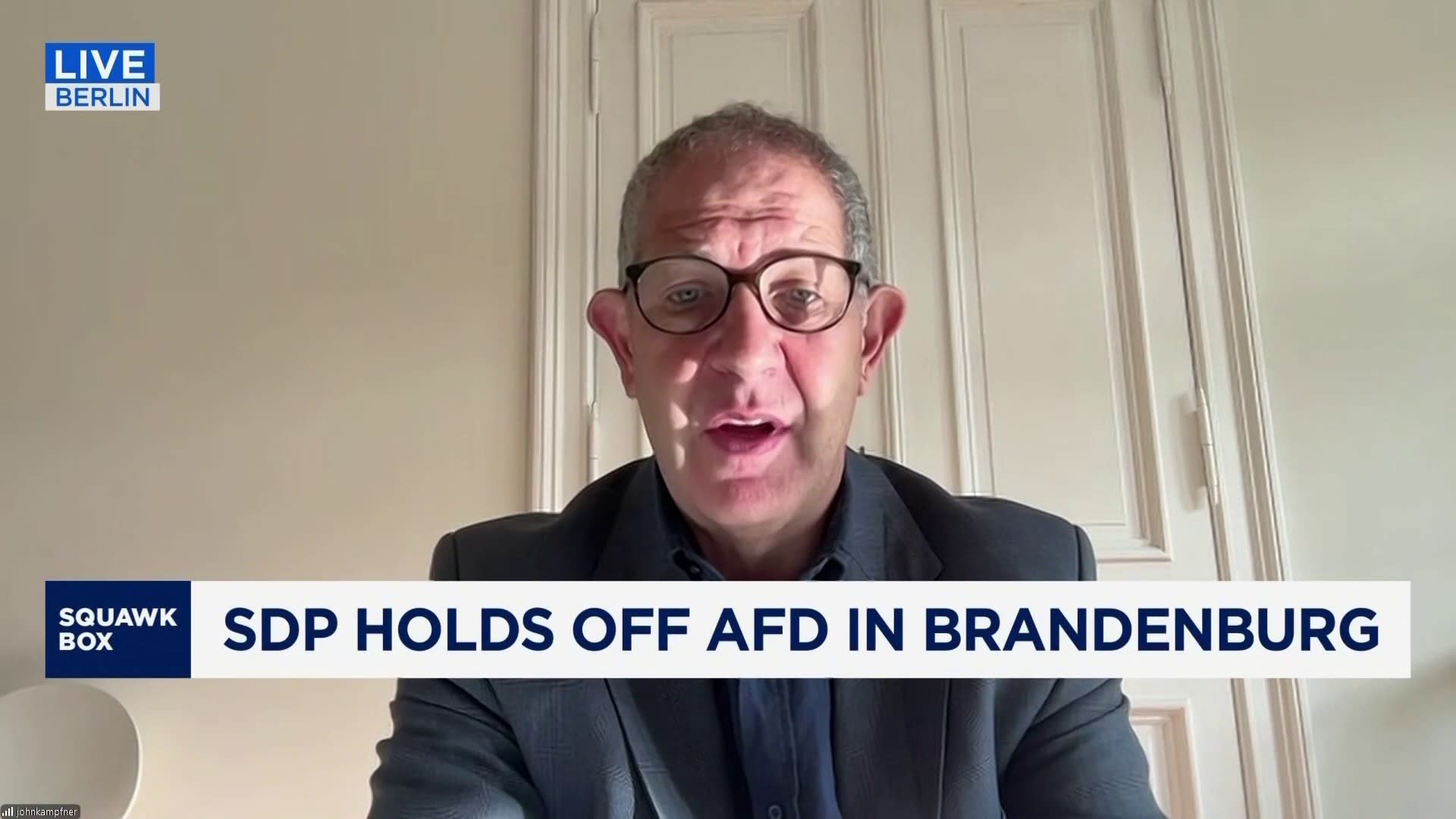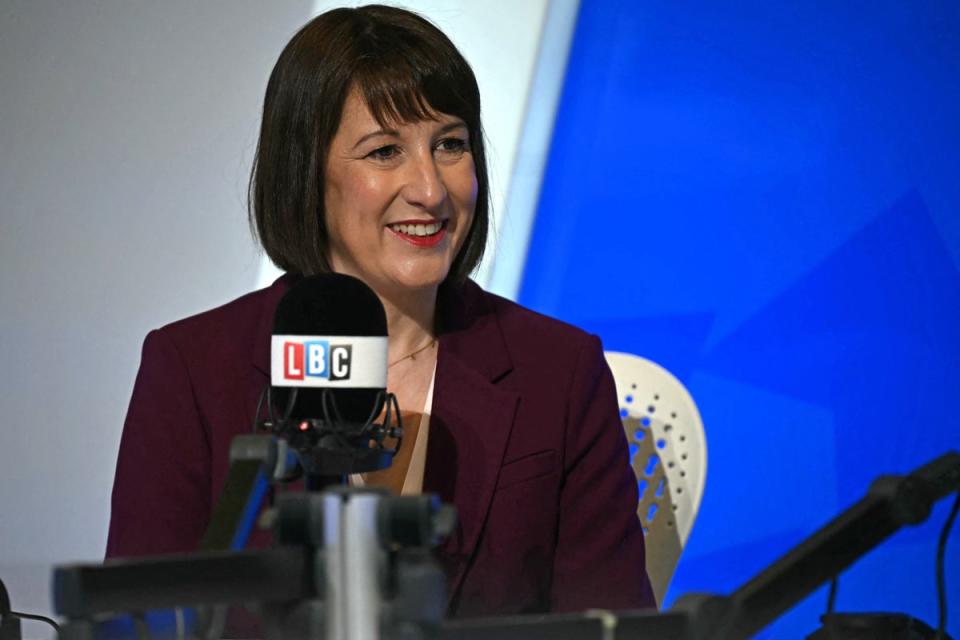Steel worker at the blast furnace tap of the at the Salzgitter AG steelworks on March 02, 2020 in Salzgitter, Germany.
Maja Hitij | Getty Images News | Getty Images
107392634Europe looks to be heading toward a downturn as its biggest economies, Germany and France, battle political and economic woes at home.
Business activity in the manufacturing and services industries in both countries — Europe’s largest and second-largest economies, respectively — fell much more than expected in September, data showed Monday.
In Germany, the HCOB flash composite purchasing manager’s index (PMI), measuring business activity across both sectors, fell from 48.4 in August to 47.2 in September, a seven-month low and below expectations of 48.2.
In France, meanwhile, the composite PMI hit an eight-month low of 47.4 in September, down from 53.1 in August and below expectations of 50.6. A reading above 50 indicates expansion, while a figure below that suggests contraction.
For the euro zone as a whole, S&P Global, which compiles the data, said business activity in the single currency area had decreased in September for first time in seven months, falling to 48.9 in September from 51 a month before.
The Olympic Games gave France’s economy a boost in August, 2024.
Olympia De Maismont | Afp | Getty Images
The PMI data — a closely-watched gauge of economic activity in the region — are the latest figures to indicate a sharp slowdown in Europe’s traditional growth drivers, with both Germany and France tackling political upheaval and economic uncertainty at home.
“The big decline in the euro-zone Composite PMI suggests that the economy is slowing sharply, that Germany is in recession and the France’s Olympics boost was just a blip,” Andrew Kenningham, chief Europe economist at Capital Economics, said in analysis Monday.
“With France’s new minority government now planning to tighten fiscal policy significantly, prospects for growth in France look increasingly poor,” Kenningham noted, while for Germany, he said “the surveys also suggest that Germany is falling deeper into recession.”
‘Sick man’ of Europe
Germany’s downturn is not new, with the country’s once-booming export-orientated economy flirting with recession for well over a year now. Ahead of the latest PMI data, economists had expected Germany to grow just 0.3% in 2024, according to the Bundesbank; the European Commission’s spring forecast was even more pessimistic, predicting just 0.1% growth this year.
The country’s latest PMI data shows that a “technical recession seems to be baked in,” Cyrus de la Rubia, chief economist at Hamburg Commercial Bank (HCOB), said in analysis Monday. He expects German GDP for the current quarter to fall 0.2% compared to the quarter before.
“In the second quarter GDP already shrank at a rate of 0.1%. There is still some hope that the fourth quarter will be better as higher wages combined with lower inflation should boost not only real income but also consumption, supporting domestic demand,” he added.
A consumer selects vegetables at a supermarket on March 12, 2024 in Berlin, Germany.
China News Service | China News Service | Getty Images
Once Europe’s poster-child for growth, Germany is now likened to the “sick man” of Europe by economists.
“The German economy continues to struggle for momentum, fuelling concern that the headwinds are structural rather than just cyclical,” J.P. Morgan euro area economist Greg Fuzesi said in a note Friday, entitled “Checking in on the German patient.”
“It is certainly easy to list many challenges: Chinese growth and competition, higher energy prices, the green transition, transformation in the car sector, population ageing and a backlog in public infrastructure investment,” he said, noting that there is also a perceived inability of the three-way coalition government to tackle these challenges, “which weighs on confidence.”
French political woes
In France, after months of political uncertainty following an inconclusive snap election earlier this year, a government has only just been formed under new Prime Minister Michel Barnier.
The veteran Conservative and former Brexit negotiator has inherited something of a poisoned chalice, however, with the country facing acute fiscal challenges that require immediate attention.
Barnier’s first task is to oversee the formation of a draft budget for 2025 in record time, as it must be put to the vote in France’s National Assembly in early October.
The government must also present a deficit reduction plan to the European Commission within weeks if it is to avoid disciplinary proceedings, as its budget deficit, deemed “excessive” by the EU’s executive arm, continues to break EU rules. France this week asked the Commission to extend its deadline of Sept. 20 to submit debt reduction proposals.
Newly appointed France’s Prime Minister Michel Barnier arrives for the handover ceremony with outgoing Prime Minister Gabriel Attal at the Hotel Matignon in Paris, France, September 5, 2024.
Sarah Meyssonnier | Reuters
The ongoing threat posed by the far-right National Rally opposition, led by Jordan Bardella and Marine Le Pen, also remains and could see Barnier’s government vulnerable to challenges from both the far-right and far-left, via the New Popular Front (NFP or FP) alliance. Both blocs feel sidelined after the two-round election in June and July saw both perform well in respective rounds of the vote.
Analysts including David Roche, president of Quantum Strategy, believe the Barnier-led government is unlikely to last beyond a year, putting much-needed economic and budgetary reforms on the backburner.
“This will cause France’s fiscal deficit and debts to worsen. France will defy the EU on the Excessive Deficit Procedure. Political paralysis now has both France and Germany by the throat,” Roche said.
“The RN & FP will wait for the one year anniversary of the legislative elections — the earliest date new legislative elections can be held legally — before bringing the Barnier hodge podge down.”
He added that no reforms will be done during this time. “Stay short French government bonds even if it requires patience,” Roche advised.
German Chancellor Olaf Scholz and French President Emmanuel Macron address the media during a press conference at Schloss Meseberg on May 28, 2024 in Gransee, Germany.
Michele Tantussi | Getty Images News | Getty Images
The far-right also poses a threat in Germany, with the Alternative for Germany party performing well in recent state elections as immigration, integration and an economic downturn become focal points of public discontent.
Chancellor Olaf Scholz ‘s center-left Social Democratic Party (SPD) only narrowly held on to power in his home state of Brandenburg in this weekend’s regional election, just about keeping the AfD at bay.
A defeat to the AfD could have had major repercussions for Germany’s leadership given the sharp rise of the far-right’s popularity among parts of the German electorate. The far-right party won its first state election in Thuringia at the start of the month, and came a very close-second in Saxony in a separate vote.

Ian Bremmer, founder and president of the Eurasia Group consultancy, commented earlier this month that the center was “imploding in the European Union’s two largest economies.”
“In France, the far left and far right outperformed in the snap parliamentary election called by President Emmanuel Macron … but are now being cut out of the unstable minority government led by the center-right’s Michel Barnier, meaning their constituencies are angrier, while their leaders take no responsibility for governing their way out of the troubles. The arrangement keeps Macron in power for now, but only makes the extremes more powerful in upcoming elections,” he noted in emailed comments.
Marine Le Pen and Jordan Bardella at the final rally before the June 9 European Parliament election, held at Le Dôme de Paris – Palais des Sports, on June 2, 2024.
Nurphoto | Nurphoto | Getty Images
Similar political developments are taking place in Germany, Bremmer said, with political wins for the AdD and the issues that propelled the party’s rise — including strong anti-migrant sentiment, economic populism, and opposition to support for Ukraine — predicted by Bremmer to only continue to grow in popularity.
“The political buffer remains a strong European Union with largely continuous leadership — and so there’s no longer growing efforts at exit … but domestic policies are heading against the establishment, [and are] part of a broader fragmented globalization trend,” Bremmer said, adding that there was “much to watch here.”
EMEA Tribune is not involved in this news article, it is taken from our partners and or from the News Agencies. Copyright and Credit go to the News Agencies, email news@emeatribune.com Follow our WhatsApp verified Channel





